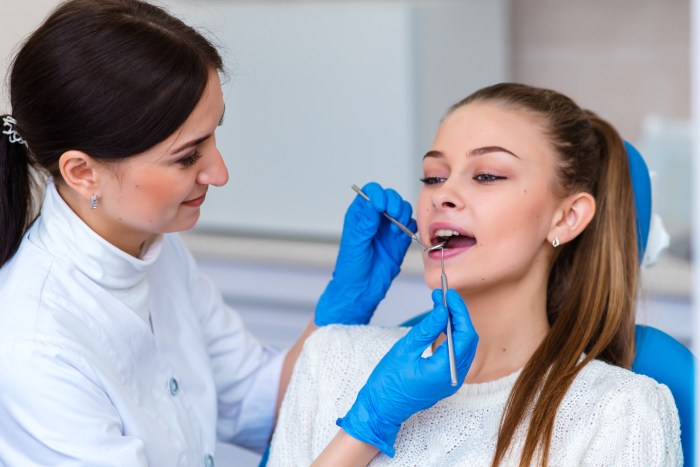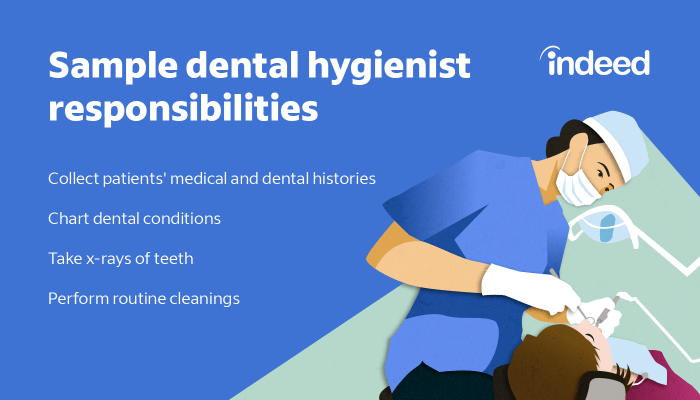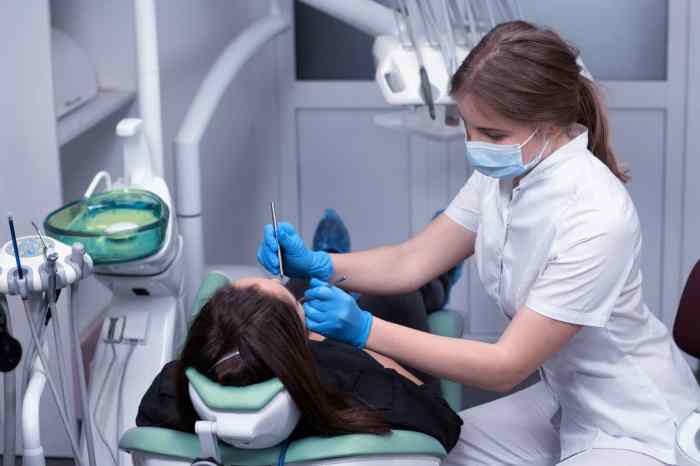Exploring the comprehensive dental hygienist job description pdf, this introduction immerses readers in a narrative that highlights the significance of dental hygienists within the healthcare system, their responsibilities, qualifications, and the tools they employ. Delving into the details, the document provides a thorough overview of the profession, offering valuable insights for aspiring and practicing dental hygienists alike.
The content of the second paragraph provides descriptive and clear information about the topic.
Job Overview
Dental hygienists play a crucial role in the healthcare system by providing preventive and therapeutic oral care services. They are responsible for assessing, diagnosing, and treating oral health conditions, as well as educating patients on proper oral hygiene practices.
Dental hygienists work in various settings, including dental offices, clinics, and hospitals. They typically work regular hours, but may need to work evenings or weekends to accommodate patient schedules.
Importance of Dental Hygienists
Dental hygienists are essential members of the healthcare team. They help prevent and treat oral diseases, which can have a significant impact on overall health. Dental hygienists also play a vital role in educating patients about proper oral hygiene, which can help prevent future dental problems.
Work Environment and Hours
Dental hygienists typically work in clean, well-lit environments. They may spend most of their time standing or sitting, and may need to use a variety of instruments and equipment.
Dental hygienists typically work regular hours, but may need to work evenings or weekends to accommodate patient schedules.
Qualifications

To become a dental hygienist, individuals must meet specific educational and training requirements. They must also possess the necessary skills and experience to perform their duties effectively. Continuing education is crucial for dental hygienists to stay updated on the latest advancements in the field.
Education and Training
Dental hygienists must complete an accredited dental hygiene program at a community college or university. These programs typically take two to three years to complete and include coursework in oral anatomy, dental materials, nutrition, and preventive dentistry. After completing their education, dental hygienists must pass a national board exam to obtain their license.
Skills and Experience
Dental hygienists need a combination of technical skills and interpersonal skills to succeed in their roles. They must be proficient in performing oral exams, taking X-rays, and cleaning teeth. They must also be able to communicate effectively with patients and provide them with oral hygiene instructions.
Continuing Education
Dental hygiene is a constantly evolving field, and dental hygienists must commit to continuing education to stay up-to-date on the latest advancements. They can attend conferences, take online courses, or read professional journals to learn about new techniques and technologies.
Job Duties: Dental Hygienist Job Description Pdf

Dental hygienists perform a range of duties to maintain oral health and prevent dental disease. These duties include:
Patient Education and Counseling
Dental hygienists play a vital role in educating patients about oral hygiene and disease prevention. They provide instructions on proper brushing and flossing techniques, nutrition, and other lifestyle factors that affect oral health. Additionally, they counsel patients on the importance of regular dental checkups and professional cleanings.
Preventative Care and Treatment Planning
Dental hygienists are responsible for performing preventive dental care procedures, such as scaling and root planing to remove plaque and tartar buildup. They also apply fluoride treatments and sealants to strengthen teeth and prevent decay. In collaboration with dentists, dental hygienists contribute to treatment planning by assessing patients’ oral health needs and recommending appropriate interventions.
Tools and Equipment

Dental hygienists use a variety of tools and equipment to perform their duties. These include:
- Dental explorers: These are sharp, pointed instruments used to examine teeth for cavities and other problems.
- Dental scalers: These are used to remove plaque and tartar from teeth.
- Dental curettes: These are used to remove calculus from teeth.
- Dental polishers: These are used to polish teeth and remove stains.
- Dental floss: This is used to remove plaque and food particles from between teeth.
- Mouth mirrors: These are used to examine the inside of the mouth.
- Dental X-ray machines: These are used to take X-rays of the teeth and jaw.
It is important for dental hygienists to properly use and maintain their equipment. This includes following the manufacturer’s instructions for use and maintenance, and sterilizing equipment after each use. Dental hygienists must also follow infection control and safety protocols to prevent the spread of infection.
Proper Use and Maintenance of Dental Hygiene Equipment, Dental hygienist job description pdf
Dental hygienists must follow the manufacturer’s instructions for use and maintenance of their equipment. This includes:
- Using the equipment only for its intended purpose.
- Inspecting the equipment before each use for any damage.
- Cleaning and sterilizing the equipment after each use.
- Storing the equipment in a clean and dry place.
Infection Control and Safety Protocols
Dental hygienists must follow infection control and safety protocols to prevent the spread of infection. These protocols include:
- Wearing gloves, masks, and other protective gear when performing dental procedures.
- Washing hands thoroughly before and after performing dental procedures.
- Sterilizing all equipment after each use.
- Disposing of sharps in a sharps container.
- Following the manufacturer’s instructions for use and maintenance of infection control products.
By following these protocols, dental hygienists can help to prevent the spread of infection and protect the health of their patients.
Patient Care
Dental hygienists play a vital role in providing comprehensive oral healthcare to patients. Building rapport with patients is crucial for establishing a positive and trusting relationship, which enhances the overall patient experience and facilitates effective treatment outcomes.
To create a comfortable and positive patient experience, dental hygienists employ various techniques, such as active listening, empathy, and clear communication. They address patients’ concerns and provide detailed explanations of procedures, ensuring that patients feel informed and at ease throughout their appointment.
Managing Patient Anxiety and Fears
Dental anxiety is a common concern among patients, and dental hygienists are trained to manage these fears effectively. They use relaxation techniques, such as deep breathing exercises and distraction methods, to help patients cope with anxiety during treatment. Dental hygienists also provide reassurance and support, creating a safe and non-judgmental environment that encourages patients to overcome their fears.
Professional Development

Dental hygienists are encouraged to engage in continuous professional development to stay abreast of the latest advancements in the field and enhance their skills. Attending conferences and workshops provides opportunities to learn from industry experts, network with peers, and stay informed about new techniques and technologies.
Joining professional organizations like the American Dental Hygienists’ Association (ADHA) offers access to educational resources, mentorship programs, and networking events that support professional growth.
Conferences and Workshops
Conferences and workshops are invaluable platforms for dental hygienists to expand their knowledge and stay updated with the evolving dental landscape. These events offer a wide range of educational sessions, hands-on workshops, and presentations by renowned professionals. By participating in these events, dental hygienists can gain insights into best practices, emerging technologies, and current research findings, enabling them to provide the highest quality of patient care.
Professional Organizations
Professional organizations such as the ADHA play a crucial role in the professional development of dental hygienists. These organizations offer a range of benefits, including access to continuing education courses, webinars, and online learning platforms. Membership in professional organizations also provides opportunities for networking, mentorship, and involvement in advocacy efforts, which can contribute to career advancement and professional satisfaction.
Salary and Benefits
Dental hygienists earn a competitive salary and enjoy a comprehensive benefits package that may include health insurance, dental insurance, vision insurance, paid time off, and retirement benefits.
The average salary for dental hygienists in the United States is $77,000 per year, according to the Bureau of Labor Statistics. However, salaries can vary depending on factors such as experience, location, and employer.
Factors Affecting Salary and Benefits
- Experience:Dental hygienists with more experience typically earn higher salaries than those with less experience.
- Location:Dental hygienists who work in urban areas typically earn higher salaries than those who work in rural areas.
- Employer:Dental hygienists who work for private practices typically earn higher salaries than those who work for public health clinics.
Importance of Negotiating a Fair Salary and Benefits Package
It is important for dental hygienists to negotiate a fair salary and benefits package that meets their needs. This can be done by researching the average salary and benefits for dental hygienists in their area, and by being prepared to discuss their salary expectations with their employer.
Answers to Common Questions
What is the role of a dental hygienist?
Dental hygienists are responsible for providing preventive dental care, including cleanings, fluoride treatments, and sealants. They also provide patient education on oral hygiene and healthy habits.
What are the qualifications to become a dental hygienist?
Dental hygienists must complete an associate’s degree or bachelor’s degree in dental hygiene from an accredited program.
What are the benefits of being a dental hygienist?
Dental hygienists enjoy a stable career with good earning potential and opportunities for advancement. They also have the satisfaction of helping patients maintain good oral health.